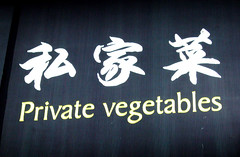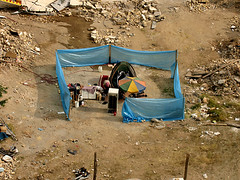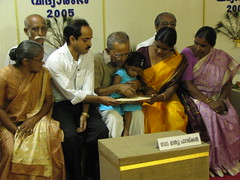Privacy and Social Networks
 Mark Ury has a great post on Privacy at his blog The Restless Mind. As I said in my comment on his Blog, I'd like to make an observation about why managing privacy (and other rules of social etiquette) is even harder than it seems.
Mark Ury has a great post on Privacy at his blog The Restless Mind. As I said in my comment on his Blog, I'd like to make an observation about why managing privacy (and other rules of social etiquette) is even harder than it seems. Real social networks have actual humans as the end points in the graph. Complicated, technology independent humans. I have dozens, perhaps even hundreds of social networks I participate in, and each one has its own complex rules of etiquette and privacy, even when the membership of the network is mostly or even completely the same. In fact, it's those rules that really define the network itself: the people I trust with my kids, the people I gossip with at work, or the group of cousins in my family that happen to be around the same age. Each of these is defined as much or more by what we do together (the "social grooming" as Robin Dunbar calls it), as by the membership, which may be mostly or even entirely the same.
Real social networks have actual humans as the end points in the graph. Complicated, technology independent humans. I have dozens, perhaps even hundreds of social networks I participate in, and each one has its own complex rules of etiquette and privacy, even when the membership of the network is mostly or even completely the same. In fact, it's those rules that really define the network itself: the people I trust with my kids, the people I gossip with at work, or the group of cousins in my family that happen to be around the same age. Each of these is defined as much or more by what we do together (the "social grooming" as Robin Dunbar calls it), as by the membership, which may be mostly or even entirely the same.  One reason for why these rules especially difficult to express in software is that these networks (especially the ones most established in my life) are typically multi-modal by nature. Take the network of "the people who love and care for my kids", as an example: some are in FB, some are email-only, and some (like my Gramma) offline entirely. We humans are very typically very good at picking up on and managing these social "rules", but often have difficulty migrating those rules to a new or unfamiliar modality of communication. As the number ways in which we can communicate with each other increases (more rapidly all the time, it seems), the harder it becomes to manage the complex social rules that govern human interactions.
One reason for why these rules especially difficult to express in software is that these networks (especially the ones most established in my life) are typically multi-modal by nature. Take the network of "the people who love and care for my kids", as an example: some are in FB, some are email-only, and some (like my Gramma) offline entirely. We humans are very typically very good at picking up on and managing these social "rules", but often have difficulty migrating those rules to a new or unfamiliar modality of communication. As the number ways in which we can communicate with each other increases (more rapidly all the time, it seems), the harder it becomes to manage the complex social rules that govern human interactions. Kinzin's approach to this problem is to build what we call "Virtual Private Social Networks". You decide on the rules and membership of the network, independent of the communications technology. This is obviously easier with smaller networks, and where the level of trust and familiarity is high, so that's where we've focused ourselves. These Are My Kids lets a network of close friends and family share information about the family's kids. The rules for privacy are set by the parents, and the invited members of the network can use (nearly) any medium they like to access the network: Facebook, email, postal mail, etc. This way, busy parents can spend their time thinking about what it is they want to say, and not worrying about how or where to say it.
Kinzin's approach to this problem is to build what we call "Virtual Private Social Networks". You decide on the rules and membership of the network, independent of the communications technology. This is obviously easier with smaller networks, and where the level of trust and familiarity is high, so that's where we've focused ourselves. These Are My Kids lets a network of close friends and family share information about the family's kids. The rules for privacy are set by the parents, and the invited members of the network can use (nearly) any medium they like to access the network: Facebook, email, postal mail, etc. This way, busy parents can spend their time thinking about what it is they want to say, and not worrying about how or where to say it.Labels: bloggers, collaboration, communications, community, culture, facebook, family, family2.0, kinzin, participation, socialnetworking, teenagers, web2.0
 This post is Del.icio.us!
This post is Del.icio.us! Subscribe via RSS
Subscribe via RSS
